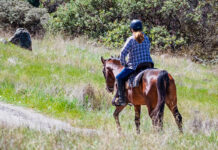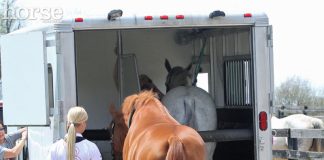 The economy is taking its toll on the horse world. Soaring feed costs, rising boarding fees and the uncertainty of the job market could force you to contemplate selling your beloved horse.
The economy is taking its toll on the horse world. Soaring feed costs, rising boarding fees and the uncertainty of the job market could force you to contemplate selling your beloved horse.
First, determine the ideal match for your horse based on his level of training, his temperament and any soundness issues. For example, a teenaged horse with manageable arthritis probably wouldn’t do for a young rider who wants to gallop around the hills six days a week. But the same horse might be the perfect fit for an adult looking for a part-time trail companion.
You can market your horse for lease in varying ways: by word of mouth, in newsprint ads, by posting fliers at local tack stores and personally contacting trainers and barn managers. If you think your horse might be happy in a lesson program, visit reputable riding schools and see if they’re interested in temporarily adding a horse to their string.
Next, figure out what sort of living accommodations you want for your horse. An ideal situation would be for your horse to remain where he currently resides, where he’s used to the daily routine. Otherwise you could require that your horse be boarded at a stable under the supervision of the barn manager or resident trainer. If you allow your horse to be kept on the leasee’s private property, make sure you are comfortable with their facility. Inspect the fencing and the footing, and don’t be shy about asking for references from their veterinarian and farrier.
The final step is writing up a formal lease agreement. Make sure you spell out precisely what can and cannot be done with your horse. If it’s a hunter, can it only be jumped in lessons? If it’s a trail horse, is it allowed to be ridden over rough terrain or taken on overnight excursions? Who is permitted to haul the horse? And what will be the protocol if you want to drop by and check on your horse or perhaps go for an occasional ride? The nitty gritty aspects of a lease agreement must also include what level of care is expected. Don’t simply say that the leasee must “blanket the horse during cold weather.” Write precisely what type of blanket you mean and your definition of “cold weather.” If you want to be extra vigilant, ask that the leasee provide insurance coverage for the horse while it’s in their care. You can also split the cost of a pre-lease vet exam, so that the horse’s current state of soundness is documented. After all, when the lease eventually ends you should expect to have the horse returned in the same condition, although there has to be some room for reasonable wear and tear.
Leasing isn’t the nightmare you might envision. By doing some networking, and patiently searching for just the right rider, you can keep your horse even in these tough times.






Interesting article. Although this would be a really hard thing to do, it’s much better than selling, where you may never see your horse again.
This is a good option for people with horses that can not afford to keep them.
Good information for those who are feeling the pinch of the economy but still want to have horses in our lives.
My gelding has been leased out to a lesson program for over a year now – I ran out of money to keep him during college and absolutely did not want to sell. He’s in a good place, I can go ride him and see him whenever I like and they take excellent care of him. He is ridden often by young girls (his favorite) who adore him, he continues to show at lower levels, and when my after college life settles down, he’ll be coming back home to me. It’s been a good arrangement for all.
pretty nofty story. It can help people make a tough decision become a bit easier.
meant nifty, not nofty in the below comment. sorry! :o)
I personally want to attest to leasing. Since I do not own my own horse and do not have time for one I have done two different half leases in the past that worked out very well.
I part-lease a gelding, and it is AWEOME! I would personally like to have a part lease rather than owning since it is a LOT cheaper, and you don’t handle all the work such as farriers, worming, and vets plus the horses ‘real’ owner and yourself can become great friends. This is a great artical, and I would recommend leaseing to anybody (except maybe if you want to show them).
I half-leased my favorite mare this past summer. It was the best horsey experience I’ve ever had!!
This is a pretty good idea. It hadn’t occured to me. Not that anyone would want to lease my mini. Something to keep in mind. I never liked the idea of leasing a horse because of the insecurity but leasing one’s own horse to someone is a great idea.
I started my horse love from leasing a horse or pony for several years. I have finally talk my parents into buying my own horse. I love doing both but I love owning a horse. Best thing my parents have ever done.
I leased a horse. And she was great! But i would never lease a horse again
My instructor was going to get me to lease Loverboy when his 1/2 leaser got her horse but then his other leaser bought him so…
My first horse was leased she was wonderful and we didn’t have to sell when I was ready to move on
This was very informational.All my questions and concerns were answered. I appreciate and, Thank you so very much.Happy you all are here. I think your article is wonderful,sure nice having your expertise.